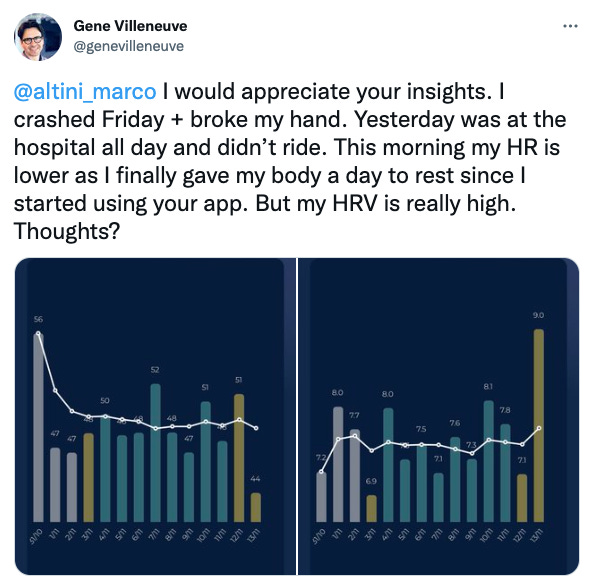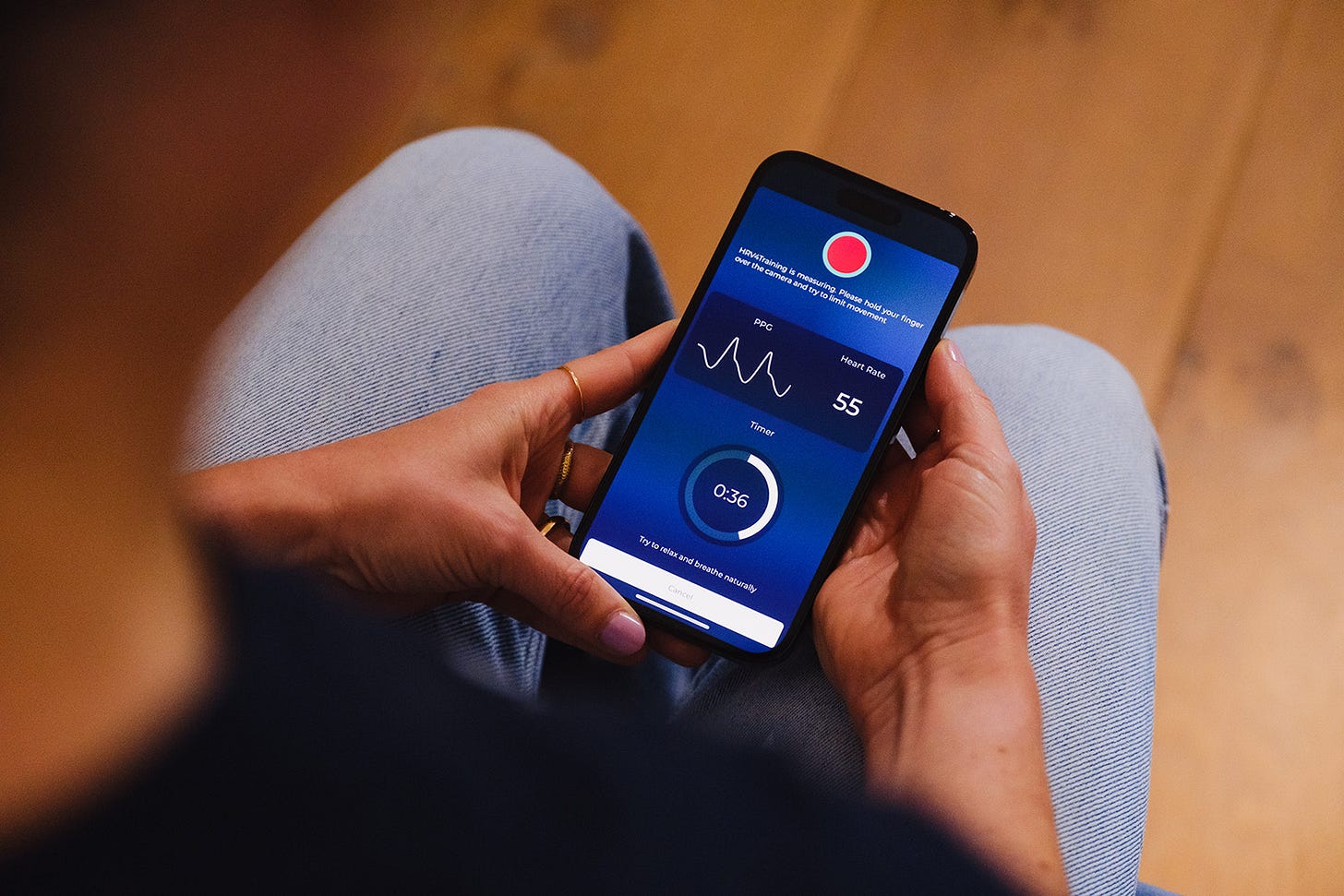Abnormally high heart rate variability (HRV)
some considerations
In a previous blog, I’ve discussed the importance of the normal range, when interpreting HRV data.
Your normal range is a representation of your historical data that defines your own, individual, frame of reference. It allows you to understand if acute (daily) and chronic (weekly) HRV responses are showing meaningful changes or just small variations that you should not worry about.
While it is quite easy to understand that a suppression in HRV is associated with higher stress (see our paper here for many examples), the situation gets a bit more complex when we are looking at abnormally high HRV, i.e. HRV scores above your normal range.
Unfortunately, research doesn’t help much on this, as there is basically nothing I could find that covers these responses. However, as more and more data has been collected by various people, users of HRV apps, or researchers experimenting in different capacities, we did gather a few insights on these abnormally high HRV scores.
Here, I’d like to discuss my current view, hoping it is helpful to you when analyzing your own or your athlete’s data.
Higher is not necessarily better
Some (most?) tools rely on the naive “higher is better” interpretation when it comes to HRV. In these tools, a high (or higher) HRV is always interpreted as a good sign and a sign that you should be going hard. This is not how physiology works. In fact, quite the contrary.
Below is an example. As Gene mentions, he had a rough day and an accident, which triggered an acute response resulting in a very suppressed heart rate and high HRV. HRV4Training flags it in yellow, advising caution. Most wearables would have said the opposite.
This is why it does not make much sense to interpret HRV (or any other physiological signal) just in one direction: blood pressure, blood glucose, etc. — all have a normal range. Similarly, HRV has a normal range, which is specific to you, as I discuss here.
While we understand from the example above that Gene’s response is negative, despite typical “good signs”, such as a lower heart rate and increased HRV, this is not always the case.
In other words, the difficulty here comes from the fact that not all abnormally high HRV scores are representative of a negative response, while this is typically the case for low scores below your normal range.
Borrowing from exercise physiology
A possible way to look at abnormally high HRV, together with abnormally high heart rate, is to borrow from exercise physiology and what we know about how heart rate changes during exercise in relation to fatigue and overtraining.
In particular, when looking at exercise data, an acute drop in heart rate often signals fatigue, despite the fact that a chronic reduction, over weeks or months, signals increased fitness. Acute and chronic responses in physiology differ, and fatigue states can often resemble optimal states, but on a different time scale (i.e. acutely, not chronically).
This is the case also for resting heart rate, and similarly, for resting HRV, in the opposite direction. If we look at it this way, we already understand that changes in resting physiology in a certain direction (e.g. reduced heart rate, increased HRV), might be something to aim for chronically, but not necessarily something positive acutely.
Busy recovering, more than very recovered
On many occasions I have heard of HRV4Training users experiencing responses similar to the one reported by Gene above but after hard races (e.g. an ironman).
A very strong stressor (an accident or a hard race) can lead to an acute, abnormally high HRV. A very high HRV can happen in situations in which your parasympathetic system is active not as a sign of readiness, but as an attempt to recover from a prior, large effort. Busy recovering, more than very recovered.
Somewhat similarly, we know that even when under high load, a positive response would be a stable or increased HRV (as I discuss here). A high HRV is in these cases associated with a functional overreaching state. However, that means that we still need to be careful, not to overdo it and slip into a non-functional overreaching state or overtraining.
In practical terms, combining information regarding context (e.g. training load, other stressors), subjective feel, and resting or exercise physiology, should help us understand what is going on when we have particularly high scores, even though as you can see, this is often a bit more nuanced than when we have suppressions.
Anecdotally, if my HRV is higher than normal but my heart rate is within my normal range, I tend to feel and perform well. On the other hand, when the high HRV is associated with a very low resting HR (acutely, as in Gene’s case), I might be overreaching. This is why we need to:
Prioritze stability, and assess when our data is within our normal range. Something good tools do, but wearables typically don’t.
Assess HRV as normalized by HR, and not only HRV alone. Something you can do in HRV4Training Pro, looking at HRV:HR, see here.
While subjective feel is always king, it might be challenging under conditions of high load to discriminate between these different conditions, and therefore ,the data might help us to make meaningful adjustments, assuming we use good tools that can allow you to assess meaningful deviations from your normal range in either direction.
That’s not the case with the toys most athletes seem to be obsessed with (or just paid to pretend to be using).
I hope this was informative, and thank you for reading!
Ways to Show Your Support
No paywalls here. All my content is and will remain free.
If you already use the HRV4Training app, the best way to support my work is to sign up for HRV4Training Pro.
Thank you!
Marco holds a PhD cum laude in applied machine learning, a M.Sc. cum laude in computer science engineering, and a M.Sc. cum laude in human movement sciences and high-performance coaching.
He has published more than 50 papers and patents at the intersection between physiology, health, technology, and human performance.
He is co-founder of HRV4Training, advisor at Oura, guest lecturer at VU Amsterdam, and editor for IEEE Pervasive Computing Magazine. He loves running.
Social:





Nicely coincidental timing as this is the kind of data I am seeing now for the last 4 days in an upwards trend but I feel more than fine so I suspect I have crossed some sort of fitness threshold with increased careful training and this is the new normal, I will report back because I am as curious as anyone as to whether this reflects something good or bad. Keep up the great work, scientific content and analyses mixed with real life work for me
Very interesting subject, as last week I had arthroscopic surgery for a ski accident that resulted in torn medial and lateral meniscus and to repair a chondral defect (multiple). I did not take any narcotics for pain, just acetaminophen and ibuprofen. My all night RHR dropped 4 bpm, and my HRV was very high. confused me as I am "naive" in that generally I believe a higher HRV (within range) is better. Thanks for the perspective.